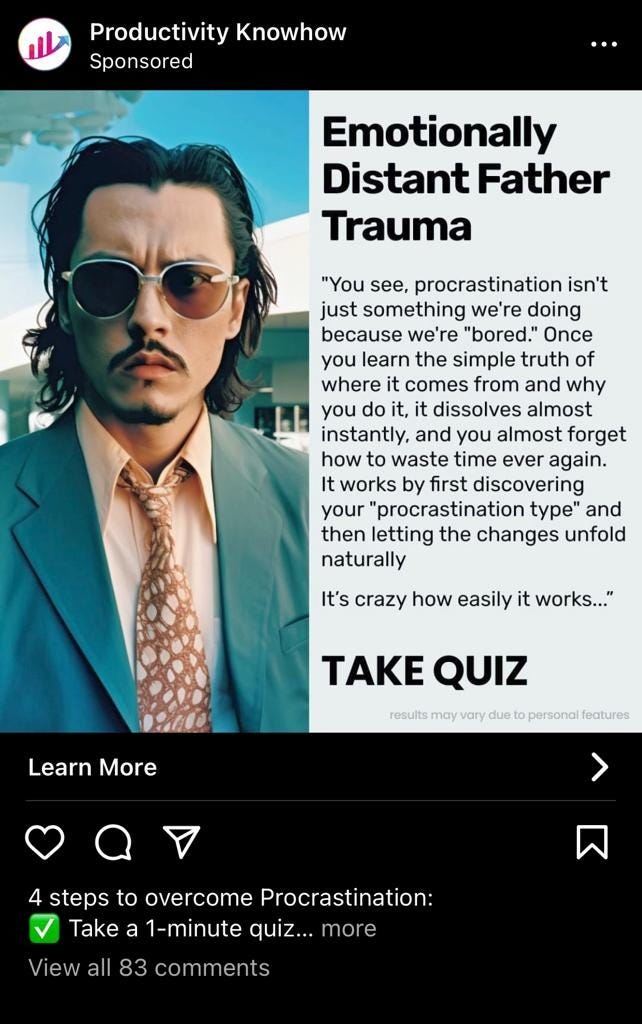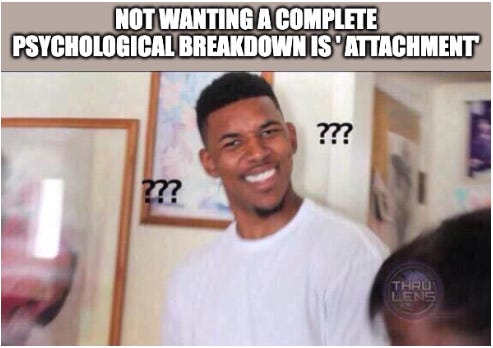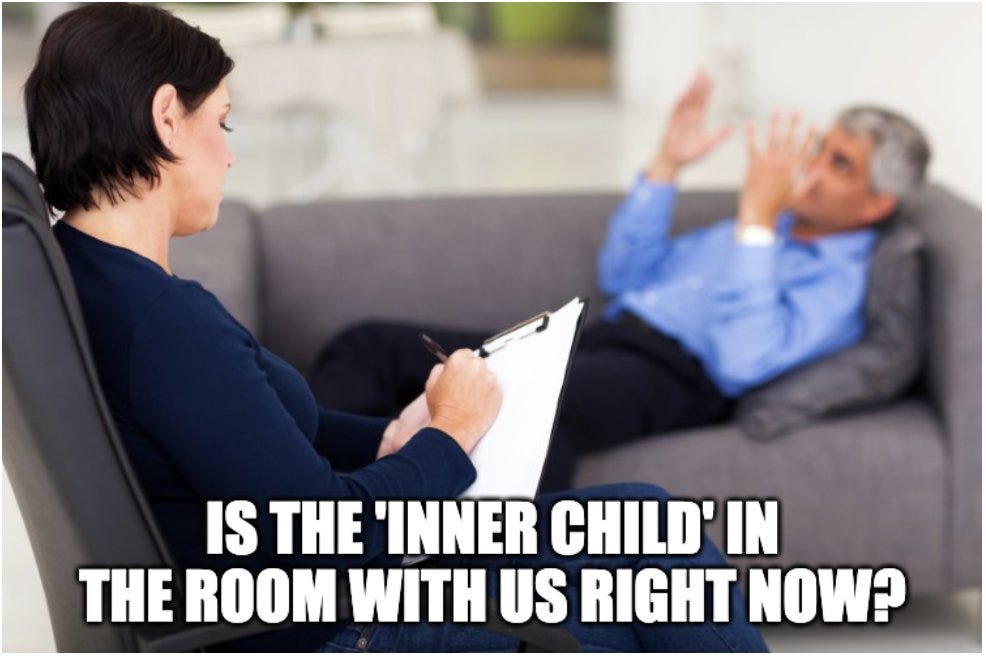Therapist argues Andrew Tate is a Hurt Child (Patreon)
Downloads
Content
*Listen to the voiceover if you can - it’s more interesting as the audio from the Tate interview is included.
Recently I released a Substack titled Are we Creating Trauma for Ourselves? where I discuss how Sigmund Freud and various sequences of events set the stage for the average person to be worried about whether or not they have ‘trauma,’ namely childhood trauma. While many people undoubtedly have negative past experiences that left a negative mark on their behavior patterns, that Substack post questions whether it is productive to ruminate on and further identify with those negative experiences. A psychotherapist encouraging you to discuss, explore and relive the emotions you felt during that traumatic experience may serve to only have you further identify with it. I even wonder if some therapists may convince people that they have a trauma that they never suspected they did. I discussed how in one Youtube video where a Dr. K talked to someone with childhood trauma, while empathetic, his comments seemed like they might affirm that trauma and further have that person identify with that trauma. This may hinder their progress in letting go of it and may slow down their moving on to focusing their mental energy on practical solutions that would improve their behaviors and mentalities. I just came across another video of someone interacting with a psychotherapist - Andrew Tate. Let’s take a look.
 </figure>
</figure>Andrew Tate is a kickboxing champion, a multimillionaire, and was recently put in Romanian jail for over three months on suspicion of human trafficking despite a lack of evidence. After months of investigation all the prosecutors come up with was the charge that Andrew Tate and his brother coerced women into doing TikTok videos for them. This was a bizarre charge considering the brothers were already multimillionaires and doing TikTok videos isn’t very lucrative. He was also put on house arrest for 7 months and was recently released.
“After 10 months. 3 in jail, 7 at home. After 15 million euro of asset seizures. After an inditement based on nothing. The file was passed to a Judge who has ruled it weak and circumstantial. I have been released from house arrest but must remain within Romania…”<figure>
 </figure>
</figure>While deliberately inflammatory, many men seem to find Andrew Tate’s takes on the world practical and inspiring. The Tate brothers have been criticized for making money off of a legal cam-girl business in the past and are often accused of being misogynists.
However, we’re not here to debate the character of Andrew Tate, but to take a look at his interview with a particular psychotherapist - David Sutcliffe. By the way, Tate invited Sutcliffe to do a podcast with him so there’s likely a ‘come on, let’s see what you got’ element to this - this probably isn’t an example of Sutcliffe’s typical therapy session. Take these comments with a grain of salt.
However, if it is representative of a typical therapy session, it would be kinda concerning. As we’ll see there were several instances where it seemed like the therapist was trying to search for and get Tate to concede to mental ailments that Tate either didn’t indicate he has or outright denied.
<figure> </figure>
</figure>1. Encourages Tate to view his childhood as problematic
At one point, Tate explains that he has nightmares which of course are an indication that Tate has some fear in his mind. Tate says that he thinks this is a natural response to something like being jailed 93 days out of the blue despite a lack of evidence.
The therapist asserted that that Tate’s fear needed to be ‘addressed.’ Tate said that while he has bad dreams he doesn’t see fear as some pathological state that needs to be excised from his psyche, especially considering it doesn’t affect his day to day life negatively.
Therapist: “…Fear creates distortions in our minds, right? I mean fear is the seat of evil, so we wanna know what we’re afraid of because if we block our fear we’re susceptible to bad actions and fooling ourselves about what they are - rationalizing. So I would argue that it’s actually vital for you in the position that you are in and the responsibility that you have to actually confront your fear in a very real way which probably goes back to your childhood. I mean your Dad was - I mean the haircut story… when I read that I’m thinking about that little boy, it must have been fucking terrifying.”
So it sounds like the therapist here is encouraging Tate to view some part of his childhood as trauma. What I’m wondering is: is that useful?
By the haircut story, the therapist here is referring to a tweet thread of Tate’s that tells the story of how Tate’s mother complained about the barber not cutting Tate’s hair well, Tate agreed with her that he didn’t like the haircut either, and then his father got very angry at this exchange and then forced Tate to shave his head to teach Tate not to worry about his hair like “a little bitch.”
Tate wrote in the tweet that:
I sat in the chair holding back tears as my head was shaved. Afterwards dad said: Your mother loves you and I love you. Nobody in the world gives a fuck about your haircut. When you grow up you’ll see - they only care about what kinda man you are.
[My father] was totally right. I look back now and THANK him. What good comes from a 13-year-old boy giving a fuck about his haircut? ZERO. … Nobody gives a fuck about my hair. They care what kinda man I am. RIP Emory Tate.
According to this tweet thread (which the therapist apparently read) Tate remembers the experience clearly, he acknowledges that it was tough (enough for him to almost cry) as kid, but he also was grateful for the experience , and he speaks very positively about his father (not just in this tweet but often).
So why is the therapist encouraging Tate to look for for trauma in his childhood or to encourage a more negative interpretation of an experience Tate has spoken positively about.
<figure> </figure>
</figure>2. Tries to get Tate to doubt his ability to understand himself
Early on, the therapist said “Does it make you nervous that there may be things that you don’t know about yourself that I’m going to try to reveal to you?” and then later had this exchange with Tate:
Tate: “I mean I psychoanalyze myself all the time, which is one of the main reasons I don’t believe in therapy and psychoanalysis…”
Therapist: “You can’t psychoanalyze yourself-”
Tate: “Of course you can-”
Therapist: (laughs)
Tate: “I do it myself.”
Therapist: “You don’t think that’s hubris?”
Now I think the therapist has a decent point that sometimes it’s useful to get other people’s perspective but I found it odd that he thinks that Tate saying he can understand himself is “hubris.” I don’t quite see why a psychotherapist who has none of the lived experiences of their patients would be in a position to understand that patient. If someone goes to a psychotherapist and says I don’t understand myself, that’s a different story. But again, in my opinion, telling someone that it’s hubris that they can understand themselves by themselves only serves to sow doubt in that person and foster dependency on the therapist.
Dr. Albert Ellis wrote in his criticism of psychoanalysis that:
Most clients are overly dependent individuals who are afraid to think and act for themselves and to risk being criticized for making mistakes. Psychoanalysis is usually a process that greatly fosters dependency<figure>
 </figure>
</figure>3. Tries to pathologize Tate’s negative feelings
Tate had been asserting that fear isn’t necessarily a bad or pathological thing, that it’s natural to have fear and people shouldn’t expect their lives to be completely lacking fear especially if they are constantly facing new challenges as they move forward in life.
Tate: “I don’t necessarily want fear to go away because I have no problems feeling bad.”
Therapist: “Well it’s not about going away it’s coming into deeper relationship with it and understanding that there’s fear that’s happening in real time but there’s also fear that may be in your psyche somewhere, in your body that’s connected to your history and that may need to be resolve because otherwise you’re projecting things out that you may not seeing reality totally clearly, that’s the thing, right? Is there a way that you’re not seeing things perfectly clearly?”
So Tate is expressing that he thinks it’s natural for someone to have some latent fear in the mind after being jailed unjustly and he doesn’t have an issue with this fear because he doesn’t think negative feelings are necessarily pathological.
However, the therapist seems to trying to get Tate to suspect his perspective ability is hindered due to deeper causes of his fear. Tate has a reasonable guess that the nightmares he’s having are a simply natural response to an event like being suddenly jailed for 93 days, but apparently the therapist thinks there’s more to it and that Tate may be torn up about his childhood.
This reminds me of the Instagram post I was making fun of in my previous post.
<figure> </figure>
</figure>Hey maybe fear isn’t a totally natural reaction to the thought of being locked in a jail cell with no proof of breaking the law, maybe I have childhood trauma from my father being emotionally distant!
4. Therapist tries to convince Tate it would be a good idea to have a psychological breakdown
The therapist says around 1:21:09, “at some point, you must be broken. You can’t fulfill your mission without being broken. Whatever that is, it has to terrify you.”
Here the therapist is talking about the hero archetype and how the hero is broken, killed, ground to dust et cetera and then he is reborn a better man.
Tate: “But can’t I be semi-broken or semi close to broken and back from the edge?”Therapist: “Death and rebirth! That’s the archetype, right? And what does that require? It means going into the cave and facing your dragon which is your deepest fear.”[…]Tate: “…On your point about death and rebirth, I feel like I don’t have to fully break, I just have to get close enough to the edge to learn something and come back.”Therapist: “Why not, why not break?”Tate: “Because if I break my empire might fall.”Therapist: “You don’t know”Tate: “Exactly, I don’t know.”Therapist: “And that’s scary.”Tate: “It is scary.”Therapist: “And that’s why you don’t want to break because it’s scary.”Tate: “I don’t want to lose what I have.”Therapist: “Yea but that attachment, what would god say to that attachment? I don’t want to lose what I have?”Tate: “But OK, I don’t want to lose what I have because I also have a responsibility for others. Let me tell you something, if my mind broke and I couldn’t come back from that-”Therapist: “What’s more important, your family or god?”Tate: “Does god want me to break? I don’t know. …and if he does, I will break.”
The therapist is speaking quite vaguely here, but it sounds like by ‘break’ he means that Tate should have some sort of psychological breakdown? Tate has done 85 professional fights and claims to have many stories of being almost killed (once led into a trap by a Jamaican taxi driver, almost stabbed to death), and he again he was abruptly put in jail on flimsy grounds.
Like him or hate him, Tate has had many opportunities to have a psychological breakdown, yet he hasn’t. So I’m wondering what kind of break the therapist means and why he thinks that would be a good thing. Is he saying that a perfectly functional, apparently very mentally resilient person should go to a psychotherapist, have that therapist coax him into conjuring up some terrible fear he didn’t know he have so he can then have a psychological breakdown (on purpose) and then he will be stronger for that?
Tate is apparently not convinced that having a breakdown is useful. He says yes, it would be scary to have a psychological breakdown not only for obvious reasons but also because there are people that depend on him. The therapist then tries to convince Tate that this is some form of ‘attachment’ : “Yea but that attachment, what would god say to that attachment? I don’t want to lose what I have?”
<figure> </figure>
</figure>I personally wouldn’t like to have a psychological breakdown, but maybe I just need to ‘let go’ of my ‘attachments’ and do say 3x the normal dose of Ayahuasca for 3 months straight until I have a psychological breakdown …so I can follow my hero’s journey and become a better man.
Frankly it feels like some kind of Freudian aikido. The cocaine addict Freud had various manipulative strategies to push his bonkers ideas about childhood sexual development onto his patients. If a patient irately rejected the idea that he wanted to have sex with his mother and feared being castrated by his father as a child, that was evidence that the patient was repressing his subconscious desires.
Similarly, the therapist seems to be dedicating a lot of time to trying to convince Tate doesn’t want to ‘face’ his biggest fear because he’s ‘attached’ to preserving what he has now and so is avoiding breaking down.
"Unexpressed emotions will never die. They are buried alive and will come forth later in uglier ways."“Out of your vulnerabilities will come your strength.”
-Sigmund Freud
Taking a page from Freud, the therapist here seems to be trying to pathologize normal, healthy mental processes like ‘I don’t want to try to force myself into a psychological breakdown because I don’t see how that would be a net positive.’
5. Therapist tries to convince Tate that he must have issues due to his father
Around 1:45:03, Tate is saying that he wouldn’t consider himself often mentally present because he’s often thinking about what needs to be done in the future. The Therapist circles this back to Tate’s father.
Tate: “I’m [mentally] present with my children for an hour or two, and then it’s like OK, back to work.”Therapist: “Was your father present with you?”Tate: “No. But I don’t think-”Therapist: “But I’m just saying, as a psychotherapist, when somebody says- the moment you said that - he wasn’t present with you, that must’ve been…”Tate: “That didn’t bother me at all.”Therapist: “It didn’t bother you??”Tate: “He had things to do. He’s a full grown man.”Therapist: “I mean, I- Y’know, we could talk about the haircut tweet…”
The therapist asks him about his father and Tate explains that his parents separated when he was 10, he started seeing his father only about once a year.
Tate: “But I always understood he’s busy and has a lot to do. So I never-”Therapist: “Can you see how a boy might interpret that as my father doesn’t care about me? …I can understand you sitting here right now, but do you understand a little boy might think ‘where’s daddy? I want daddy. I’m here alone with Mom.’”Tate: “and he might be right because some father’s don’t care but my father did care. He was just very busy.”Therapist: “But it must have been confusing for you.”Tate: “No”Therapist: “Not for the little boy?”Tate: “No.”Therapist: “Like, bring-”Tate: “I’m being honest. I’m being honest! It wasn’t, I never for a-”Therapist: “Or, or you cut off- or those feelings were so painful, overwhelming, you cut off from them so quickly and then created this mindset to deal with-”Tate: “I never for a second felt like he didn’t care about me, ever. I’d never felt that, it didn’t cross my mind.”Therapist: “Consciously.”Tate: “Consciously.”Therapist: “But is it possible that unconsciously that you have a different belief and that on some level, some of what you’re doing in the world is motived by that, like wanting to win the love of your father?”
The therapist is again playing on this Freudian concept that we all have the potential to have these repressed memories that are negatively affecting us now.
So the therapist’s world view is that quantity of time spent with the father is key, thus he assumes that Tate must have suffered as a child since his father wasn’t there more frequently. Tate however has the worldview that quality of time spent with the father is what’s important, and thus he did not feel unappreciated by his father as a boy.
First, what is the utility of encouraging Tate to reinterpret his childhood in a negative way? Second, notice that the therapist is so confident that Tate should interpret his childhood negatively that he assumes that Tate must have ‘repressed’ feelings. While Tate says he has no qualms with his childhood, the therapist says Tate must have repressed feelings (that Tate can’t access because as mentioned earlier he doesn’t think Tate can psychoanalyze himself). Heads the therapist wins, tails Tate loses.
<figure> </figure>
</figure>Therapist: “But is it possible that unconsciously that you have a different belief and that on some level, some of what you’re doing in the world is motived by that, like wanting to win the love of your father?”…Tate: “That’s semi-true because I believe I have a duty to my ancestors, I don’t think it’s coming from a place of I’m broke and trying to fix myself. I think I have the last name Tate, it was bestowed upon me and I have responsibilities to live up to the last name Tate. I do believe I have a duty to my ancestors, so is that trying to win the love of my father? Perhaps. I never felt unloved by my father, ever. In fact, I would argue I had the best father on earth. I never felt like I was owed all of his time. It was very clear to me at a young age that he was extremely busy and important and that I can earn his time, or that I can’t have as much of it as I want-”Therapist: “You have to earn his time?”Tate: “Yea.”Therapist: “A son should have to earn his father’s time?”Tate: “Yea. Why not?”Therapist: “Cause he’s a boy and a father’s love should be… at least for a boy, unconditional in some way.”Tate: “Love and time are not necessarily the same thing. If I told my father I want to play chess, I want you to teach me chess, he could find two hours. If I said to Dad I want to play video games or let’s watch TV together, he’d say ‘No son, I have things to do.’ So, to a degree I had to earn his time. His time was valuable and could not be wasted. I feel like I have a duty to my ancestors, I don’t feel like- and when I’m in jail I feel like I can’t disappoint him, and I feel like I have to do good for the world. I don’t think this is me being some kind of broken secret- this is where we’re gonna disagree. You’re gonna think I’m some broken child inside-”Therapist: “No, not broken.”Tate: “Ok OK, well the ‘inner child’ or … I’m guessing.”Therapist: “Well yes, inner child.”Tate: “I don’t think it has anything to do with that. I think I have duty and I have honor.”Therapist: “I understand that you have duty as a man, but that doesn’t mean the inner child is not there. If the inner child has been disowned in some way or his feelings have been you know relegated to the unconscious, that’s impacting you. That’s affecting you. And knowing what those feelings are and how they impact for you I think would be important information for you.”Tate: “But I was never sad. I can’t say I had a hard childhood, I can’t say I was sad. I can’t say I wish he was different.”
So here the therapist is still trying to push the idea that quantity of time with the father is key and without quantity of time, the boy cannot feel loved, so Tate’s ‘inner child’ must be suffering unbeknownst to Tate. Then, this suffering ‘inner child’ is having an impact on Tate right now yet Tate can’t see it (but the therapist somehow can.)
<figure> </figure>
</figure>To be honest, I’ve become quite suspicious of this ‘inner child’ concept that pops up more and more nowadays. When a therapist or whoever asks you to 'think about your inner child,' they are basically saying 'think of the emotional state that your ignorant, uneducated kid self that does not have the wise perspective of your adult self was in (at this or that particular time).'
Yea, my 'inner child' was hurt when he didn't get every single Spiderman toy he wanted, but he was a dumb kid.
As already mentioned in my previous post, I’m not saying reflection on your past is not useful. EMDR and MDMA therapy have shown a lot of promise and they both require reviewing distressing past events, but doesn’t mean evoking the inner child. If say you were using those therapies for childhood trauma, you would be reviewing a distressing experience while bypassing the (inner child's) unhelpful emotional response. You either pacify that habitual emotional response through a specific eye movement pattern (EMDR), or replace it with massively positive emotions (MDMA).
How often as a kid were you unable to appreciate experiences because of your lack of wisdom?
Parents don’t buy me all the toys I wanted.
Me now: I’m glad my parents didn’t spoil me.
My inner child: I want those toys. I hate my parents!
Older brother got to do things when I didn’t.
Me now: Well obviously. They did their chores and homework, I didn’t.
My inner child: How unfair! My parents like my brother more.
Dad makes me do a difficult summer job.
Me now: I’m really glad my Dad instilled a work ethic in me or I’d probably be a loser about now.
My inner child: I’ve been out in the sun for HOURS. I just wanna hang out with my friends! Why is my Dad being such a jerk?
So, perhaps investigation into the so-called ‘inner child’ may be useful if it shows you where unhelpful behavior or mental patterns come from as this may reveal how to resolve those or it may reveal other unproductive behaviors and beliefs. However, in this context, I can’t see how the therapist’s line of questioning isn’t serving to turn Tate’s gratefulness for his childhood into sadness and resentfulness. It doesn’t seem productive.
[…]Therapist: “Would it be OK for you to be angry with your father?”Tate: “No. That’s disrespectful.”Therapist: “But, I’m not saying you have to confront him. Obviously he’s not here-”Tate: “That’s selfish.”Therapist: “But it’s just a feeling, it’s a feeling and it wants to come out-”Tate: “Ungratefulness.”Therapist: “Well you’re judging the feeling.”Tate: “Yea I am. For me to sit and say to the man who made me the man I am today who I, once again, never felt unloved by who tried his very best to raise me who sacrificed for me to exist who gave me my last name who bestowed upon me the honors and principles and morals I live by today, for me to be angry at him because he was busy somedays would be brutally ungrateful.”
So at the end of the day, again this is a podcast so it might seem overcritical. But this similar line of questioning with someone who’s not as confident with their interpretation of their past or who is more easily influenced may leave a therapy session convinced they have all sorts of problems and plenty of reason to be resentful about their past.
